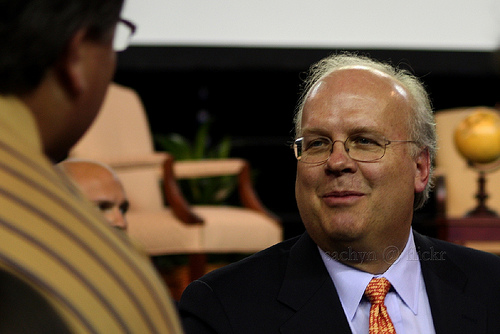
Ed Gillespie<a href="http://www.flickr.com/photos/gageskidmore/5853631046/sizes/m/in/photostream/">Gage Skidmore</a>/Flickr
On Tuesday, as baseball’s managers penciled in their lineups for the first games of the 2012 season, Mitt Romney’s campaign hailed a major roster addition of its own: GOP operative and dark-money guru Ed Gillespie.
Gillespie is a pillar of Republican politics. He chaired the Republican National Committee from 2003-05, served as a top aide to former House Majority Leader Dick Armey, and helped write the GOP’s “Contract with America” in 1994. He also worked on George W. Bush’s 2000 campaign and later served as a counselor to Bush in the White House.
What the Romney campaign’s press release doesn’t mention is Gillespie’s years as a well-traveled Washington lobbyist. At his firm, Quinn Gillespie and Associates, Gillespie’s client list included such mega-corporations as Bank of America, AT&T, now-bankrupt MF Global, Verizon, and dozens more. Quinn Gillespie bills itself as “as one of the country’s most influential and effective public affairs firms”—that is, a big-time influence peddler in DC. (Gillespie is no longer listed as working for the firm.)
Most recently, Gillespie made headlines for creating, along with Karl Rove, the powerful super-PAC American Crossroads and its shadowy nonprofit sister group, Crossroads GPS. The two groups dominated the outside spending wars in the 2010 midterms. American Crossroads led all other super-PACs in fundraising ($26.5 million) and spending ($21.5 million), and to good effect: Of the 10 races where it spent the most money, 6 went its way. Crossroads GPS, which as a 501(c)(4) nonprofit doesn’t disclose its donors, did even better: It spent $15 million and got favorable results in 8 of its top 10 races.
The Crossroads twins dominate the outside-money playing field. And that’s due in large part to Gillespie’s savvy.
Gillespie says he’s taking a leave of absence from Crossroads and his other gigs to work for Romney. But critics of super-PACs and dark money say Gillespie’s move to the Romney campaign raises more questions about the supposed independence of the Crossroads groups, which by law cannot coordinate with any candidate or campaign. They wonder: Can Gillespie completely sever his ties with the Crossroads groups?
David Donnelly, executive director of the Public Campaign Action Fund, who calls the super-PAC coordination rules “a complete fiction,” says that even if Gillespie ends his work with Crossroads, he’ll still bring his knowledge of Crossroads’ inner workings, its message and strategy, and relationships with its strategists and its funders to the Romney camp. That knowledge could prove valuable to Romney as he gears up for a general election fight with President Obama. “He could be the connective tissue,” Donnelly says.
















